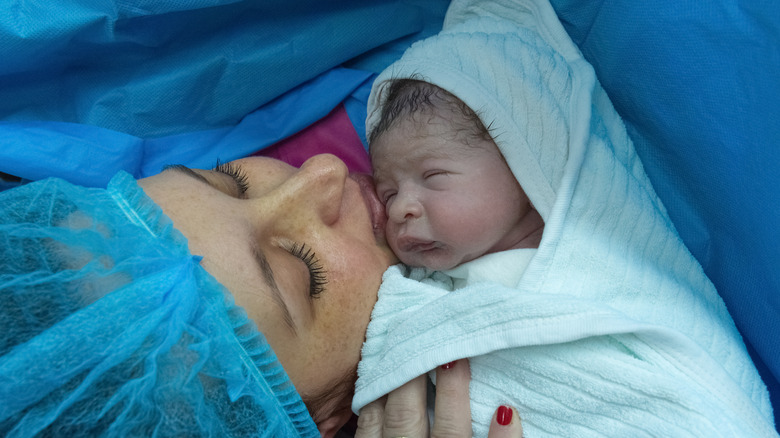The Unexpected Factor That Could Determine Whether You Have Food Allergies
Parents of school-age children with severe peanut allergies know the drill: warn the teachers, keep Benadryl on hand, don't let the kids near any friends eating PB & J, make sure the Epipens haven't expired, and call ahead before eating at a new restaurant (via WebMD). Every year, more and more children — and adults — are diagnosed with food allergies (per BBC). Some allergies are relatively mild, causing discomfort and inflammation, but many are also life-threatening, as Bethenny Frankel recently described. For decades, doctors and scientists have speculated about the causes of the increase in allergies. While allergies may have sometimes gone undiagnosed in the past, non-detection cannot account for all the changes. So why are so many people allergic to so many foods these days?
Naturally, everyone is interested in what causes allergies, and what can be done to prevent or avoid them. The rise in allergies has prompted a rise in theories, especially theories pointing to environmental causes. One popular idea was that children born by Cesarean (C-section babies) were more likely to develop allergies as a side effect of their exposure to antibiotics during birth, and lack of contact with bacteria in the birth canal.
But recent studies have disproved this explanation. Rachel Peters and her team of researchers at Murdoch Children's Research Institute in Melbourne in Australia published an article in The Journal of Trial and Clinical Immunology demonstrating that C-sections are not linked to greater allergy risk. So, what's causing the spike, then?
It's not modern birth, but modern life
While C-sections do not cause children to develop allergies, the research was onto something, building on concerns about the increased use of antibiotics in modern medicine and lessened exposure to many bacteria — what is usually called the "hygiene hypothesis." The theory suggests that, as society has modernized, people have lost key microbes that regulate immune responses.
An increasing body of research suggests a strong link between a healthy biome (good gut bacteria) and healthy, non-allergic responses to food (per National Institutes of Health). Cathryn Nagler, an immunologist at the University of Chicago, has been working hard to understand these connections (via Scientific American). Nagler has performed a number of studies involving laboratory mice which provide key insights into her studies on human infants. She posits that a number of modern lifestyle factors: fewer gut parasites; lesser exposure to infection due to vaccines; the shift from rural to urban and suburban living; and exposure to antibiotics have caused dramatic changes in the human microbiome. This, in turn, has led to people's vulnerability to more allergies.
Trust your gut (microbiome)
But Cathryn Nagler hopes that where the problem starts is where it can end, too (per Scientific American). Her studies on mice and human children have demonstrated promising results. Nagler, who has herself suffered from serious allergies, was first inspired by seeing how collagen calmed mice's allergic responses while peanut powder aggravated them. Her hypothesis is that gut bacteria affect immune responses, and that suppressed microbiomes aren't able to mediate between allergenic foods and immune systems the way they were in the past. This aligns with the surprising fact that the most allergenic foods: peanuts, tree nuts, eggs, milk proteins, wheat, soy, fish, and shellfish (per the New York Post) are actually very different biochemically. However, they all seem to take a long time to get digested, providing more time and contact for an allergic response to develop. As Nagler notes, "That seems to be what makes peanut the champion—its ability to resist degradation in the gut."
Her lab observed that infants who outgrew their allergies demonstrated higher rates of certain gut bacteria, particularly, the species called clostridia. At Boston Children's Hospital, another team led by Rima Rachid and Talal Chatila found similar results (via Scientific American). The presence of microbes helps initiate healthy immune responses. Scientists are hopeful that increasing gut biodiversity will also help alleviate allergic reactions and symptoms. How exactly that will happen is still unclear, but one thing appears to be settled: you've gotta go with your gut. Gut microbiome, that is.


